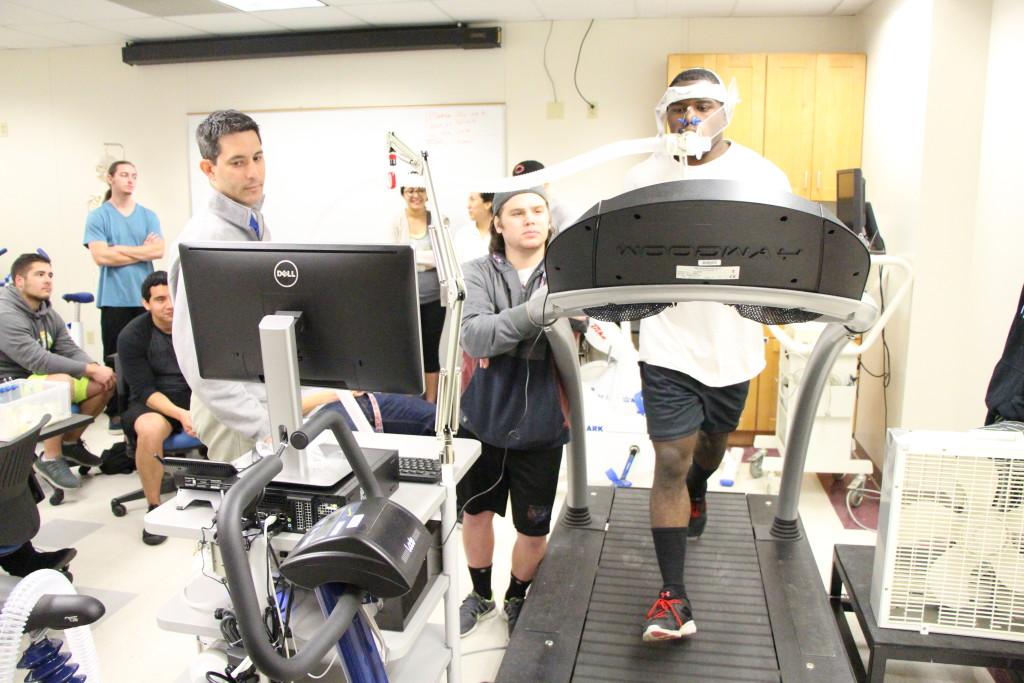The Runner Staff
With many changes occurring at CSU Bakersfield for the quarter to semester conversion, this gave the physical education and kinesiology department the opportunity to change as well.
Starting this fall PEAK will be the kinesiology department.
“Our physical education part of our enrollment has declined,” said Kris Grappendorf, the department chair for PEAK. “There is not as many students wanting to become physical education teachers, so we kind of went in line with the rest of the CSUs and decided to do just the department of kinesiology.”
Last year, PEAK had 373 majors and had 68 students receive their degrees, which were both the highest in the past 10 years. According to Grappendorf, there are approximately 430 students majoring in PEAK.
However, Grappendorf said that less than 10 percent of the majors were focused in physical education.
Grappendorf said that CSUB President Horace Mitchell proposed that converting into semesters was an opportunity to transform their curriculum.
“When we met as a department and we looked at what our graduation rates were, the number of students we had and what students were interested in going into, we thought this was our chance to take that and really define it,” she said. “Since we were getting more students that were interested in those allied health fields, we set up curriculum to allow them to do that. It was kind of a department-wide decision to do that.”
In the fall, the degree will be a bachelor’s of science in kinesiology with three concentrations: allied health, applied exercise science and physical activity leadership.
Applied health will be for students that are interested in physical therapy, occupational therapy, physician’s assistant and athletic training. Applied exercise science, which will be a lot like the current program, has a more clinical, exercise testing and nutrition component to it. Physical activity leadership will be for students who are interested in teaching, will branch out more to community-based programs so it will not be just isolated to public schools.
“They’ll learn some about organization and management and looking at more diverse life-span population, so it won’t just be a school-aged focus,” said Grappendorf on the physical activity leadership concentration. “It’ll be more from birth to elderly, so they can still work in broader career fields to that.”
The department was originally changed to PEAK in 2001 and before that it was just physical education.
“I think it broadens the elements in physical education and kinesiology,” said CSUB PEAK major Dominic Olivo. “I think it’s going to lean more toward the kinesiology portion, but more doors will be opened.”
Olivo said that he doesn’t think the changes will affect him.
“I’ll be looking into coaching and firefighting, so I don’t think it will really affect me, but there’s always that possibility.”
CSUB PEAK major Charles Steverson said that the changes come with good and bad.
“I want to be a P.E. teacher, and so some of my classes I need will be taken out. I’m barely making it out in time,” Steverson said. “This affects me because classes I would traditionally need are being taken out. I think they’re basically redoing the path for being a P.E. teacher, so if I wasn’t graduating on time, I would be screwed.”
Associate PEAK professor Jeff Moffit said that what they were doing before was good, but he thinks these changes will be even better.
“Thirty years ago students only wanted to teach P.E.,” said Moffit. “Now, from cardiac rehab to corporate fitness to sports performance enhancement to running a business where you have boot camps, there are so many things now that are available to students that will help them get to that spot.”
Moffit said they are also adapting to demand in the field.
“The demand right now has really been less on the P.E. teaching side,” he said. “I’m hoping that will change and that maybe we will build out P.E. as a fourth concentration, so right now we are just doing it differently.”
Grappendorf said that they are excited for the changes.
“Our department has grown,” she said. “We have two brand new faculty that are in their second year that have that kind of expertise in those areas, so I think we are excited.”







